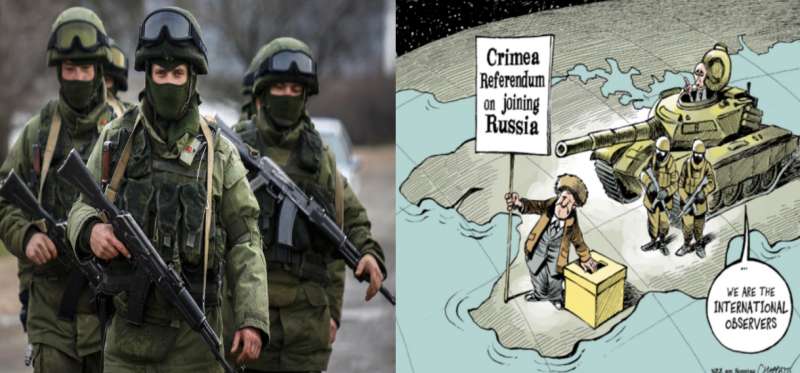Crimean children taught that Russia didn’t invade Crimea and that Ukraine was an accident

Almost seven years after Russian soldiers seized control of Crimea and the world had to resurrect the term annexation, last used about Adolf Hitler, in response, Crimean children are learning quite a different version of history. It is one in which Crimeans were the key players, not Russia, and in which Ukraine was the bad guy, along with those western countries who took its side.
While Russia’s aggressive militarization of Crimea and glorification of war among very young children are rightly eliciting enormous concern, the distortion of history that Russia is instilling from an early age creates a false reality in which such indoctrination becomes dangerously absolute.
Valentina Potapova, Head of the Almenda Centre for Civic Education, has collected just some of the examples of how Russian school textbooks present events in 2014, as well as a methodological guide for teachers from 2014.
There is no mention of Russian soldiers at all, nor of the armed paramilitaries whose abductions, torture and at very least one horrific murder were very widely reported by the world media.
Instead, children are told that “on the basis of the results of a referendum (96% ‘for’), the peninsula on 21 March 2014 joined the Russian Federation. Crimea, whose territory had, without any grounds, been handed to Ukraine in 1954 by Nikita Khrushchev, returned to the Russian Federation”. The 11th grade students do learn also that “governing circles in the USA, who supported the coup in Ukraine, assessed the situation that arose as Russian aggression against it [Ukraine] and introduced economic sanctions against our country”, with this reinstating Cold War American-Russian relations. It would be hard to imagine any but the most thinking of school students even understanding that they should delve deeper into why the sanctions were imposed. The lies about the pseudo-referendum of 16 March 2014 are repeated in every textbook and on state-controlled media, and are most unlikely to be understood as deception.
That this was very deliberate indoctrination is evident from the Methodological Handbook ‘Crimea in the History of Russia’, by K.A. Kochegarov, published in 2014. The material begins with the headline: “FOR EVER TOGETHER!” and a highly inaccurate account of the so-called ‘referendum’.
The same dubious statistics for over 90% support are presented, as well as claims about huge queues to vote throughout Crimea. No mention, of course, is made of the call by the Mejlis of the Crimean Tatar people to boycott the event, which is believed to have been widely heeded.
It is claimed that “the referendum took place in full accordance with the norms and principles of electoral law, in open, democratic circumstances.” People are alleged to have gone to vote as though to a festival, without any mention of the fact that Russian soldiers with machine guns and armed paramilitaries were stationed everywhere.
The author claims that his ‘festive’ and ‘democratic’ event was recognized as such “by international observers and representatives of very different media, including Western European and American”.
While it can only be guessed which ‘very different media’ Kochegarov had in mind, we do know in detail who the neo-Nazi or far-right and other pro-Kremlin ‘observers’ were and why it was specifically they who were invited. Many of them have been used, and doubtless lavishly funded, to ‘observe’ and approve Russia’s other dodgy electoral stunts.
That all of this was fake is well-known, as are the reasons why Russia went to such efforts to conceal the illegitimacy of the event. Luc Michel, a far-right and reliably pro-Kremlin Belgian politician was presented on the Russian state-controlled TV Rossiya 24 as from the OSCE. The latter had, together with all other legitimate bodies, refused to observe and recognize such a flawed and illegal event.
The supposed overwhelming support has also been disputed by President Vladimir Putin’s own Human Rights Council. This gave a very much lower turnout, and significantly lower results
The list of lies and distortions is too long to give in detail. Such Soviet style rewriting of history is already disturbing in Russia. In occupied Crimea it is a grave crime. Russia is recognized as an occupying state by the UN General Assembly, all international bodies and democratic nations, as well as by the International Criminal Court at the Hague.
Instead of complying with international law and ending its occupation of Ukrainian sovereign territory, Russia is actively instilling anti-Ukrainian propaganda and trying to destroy identification with Ukraine.
The same history textbooks present the post-Maidan government as “unwilling to consider the economic and cultural values of the Russian-speaking East of Ukraine” and claim (in ‘History of Russia. 10th Grade) that Ukraine was planning to make it impossible to use the Russian language.
In August 2019, a new Russian textbook in verse for children claimed that Ukraine “has stirred up war and vengeance” and that people have been prohibited from speaking Russian.
This and similar narrative was used in 2014 to justify Russia’s aggression against Ukraine. Now, the soldiers, the armed paramilitaries and the violation of international law have been omitted from textbooks, leaving the lies about Ukraine and myths about Crimea having always been part of Russia and Crimeans having clamoured to return to the fold.





